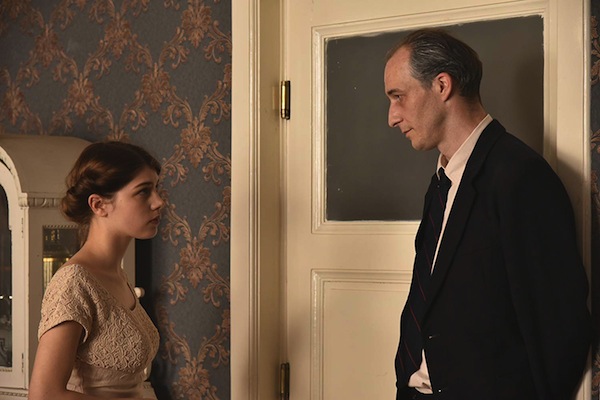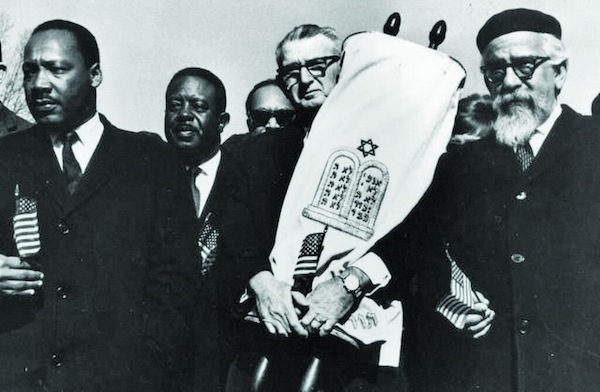Abigél Szoke and Károly Hajduk in the film Those Who Remained. (photo from Menemsha Films)
The Hungarian movie Those Who Remained has been making the rounds at international film festivals, including, in recent weeks, the Victoria International Jewish Film Festival. And perhaps no other film at this year’s VIJFF, which contained six features and one short, generated as much discussion afterwards.
“In its purest form, Those Who Remained represents near-perfect film composition, entailing exceptional directing, editing, pacing, acting and cinematography. A film of this calibre only comes along every few years,” said Farley Cates, a committee and jury member of this year’s VIJFF.
“This film was selected for its ability to leave such a strong impression on the viewer, pondering its many layers and facets from a psychological and geopolitical perspective. This film is like a wondrous painting in which the longer you look at it, the more you see happening,” added Cates, who will serve as co-director of the festival in 2021.
The film takes place in Budapest during the period between the end of the Second World War and the 1956 Hungarian Revolution. While surviving Hungarian Jews did go to Israel and elsewhere, a large number stayed in their homeland. The Jewish population of Hungary today is estimated to be well over 100,000, the vast majority of whom live in Budapest.
The postwar period for Jews who remained in Hungary was difficult. An Orwellian state of affairs had commenced: people were questioned by the police in the middle of the night; colleagues reported on other colleagues. Amid this upheaval in Hungarian society, the two principal characters in the film – Aldo, a middle-aged doctor, and Klara, a teenage girl – deal with the trauma they experienced during the Holocaust.
Abigél Szoke, who plays Klara, was selected by Variety as one of the “10 Europeans to watch” in 2020. The magazine calls her a “revelation”: “She makes Klara’s energy, pain and smarts palpable, all the while being touchingly tuned to the emotional shadings of Aldo.”
The relationship between Aldo (played by Károly Hajduk) and Klara never develops into anything scandalous, though some of the peripheral characters in the film perceive it to be so. Despite Klara’s advances, Aldo does not allow the relationship to become sexual.
The film is a tale of survival, depicting two people’s attempts to get on with the normal, sometimes banal tasks of everyday life within the shadow of the unspeakable atrocities they witnessed and experienced only a very short time before.
Repressed emotions among survivors was a central theme to the VIJFF panel discussion after the film. Speakers included Budapest-born survivor Adrienne Carter, University of Victoria professor Charlotte Schallié, psychologist and member of the Victoria Shoah Project Robert Oppenheimer and music professor Dániel Péter Biró of the University of Bergen in Norway. Among other things, they discussed the common tendency of many survivors to refuse to talk about the events of the camps and the persecution afterwards, just as, in the film, Aldo refuses to say anything about the loss of his wife and children.
What is interesting, too, about this movie, the panelists noted, is that it was made in a Hungary led by Viktor Orban, a populist, nationalist and authoritarian leader who has presided over the country in an undemocratic fashion for the past 10 years. In fact, Hungary has produced a number of films set in the period around the war recently, including 1945 (2017) and Son of Saul, which was selected as the best foreign language film at the 2015 Academy Awards.
Orban has displayed a penchant for playing up the antisemitic caricature of Jews as the power brokers of the world stage. A popular target of his has been 90-year-old Hungarian-born financier George Soros, a regular figure of derision among right-wing groups in North America, as well. In 2017, Orban, who ironically received a scholarship from the Soros Foundation to study at Oxford in the late 1980s, plastered billboards across the country in an anti-migrant campaign featuring a smiling Soros that read “let’s not let Soros laugh in the end.”
Sam Margolis has written for the Globe and Mail, the National Post, UPI and MSNBC.
***
Note: This article has been amended to reflect the correct name of the film festival. It is the Victoria International Jewish Film Festival.


